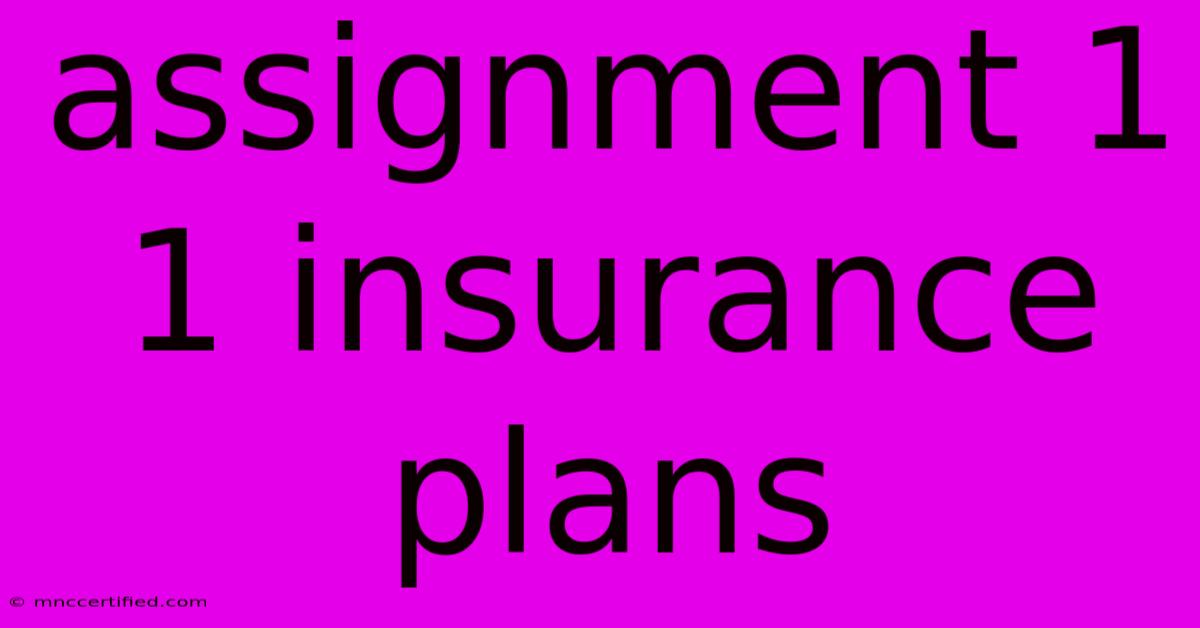Assignment 1 1 Insurance Plans

Table of Contents
Decoding Assignment 1: A Deep Dive into Insurance Plans
Choosing the right insurance plan can feel like navigating a maze. Assignment 1, whether it's for a school project or a personal endeavor, often requires a thorough understanding of various insurance plans. This comprehensive guide breaks down the key aspects, helping you ace your assignment and, more importantly, understand how to protect yourself financially.
Understanding the Basics of Insurance Plans
Before delving into specific plan types, let's establish a foundational understanding. Insurance is a contract where an individual (policyholder) pays a regular fee (premium) to an insurance company (insurer) in exchange for financial protection against potential losses. These losses can range from medical expenses to property damage. The key elements are:
- Policyholder: The individual or entity purchasing the insurance.
- Insurer: The company providing the insurance coverage.
- Premium: The regular payment made by the policyholder.
- Claim: A formal request for financial compensation from the insurer after a covered loss.
- Deductible: The amount the policyholder must pay out-of-pocket before the insurance coverage begins.
- Copay: A fixed amount the policyholder pays for a covered healthcare service.
- Coinsurance: The percentage of costs the policyholder shares with the insurer after the deductible is met.
Types of Insurance Plans: A Detailed Overview
There's a vast array of insurance plans catering to different needs. For Assignment 1, focusing on a few key types will likely suffice.
1. Health Insurance Plans
This is arguably the most crucial type of insurance. Health insurance plans cover medical expenses, including doctor visits, hospital stays, surgeries, and prescription drugs. Several types exist:
- HMO (Health Maintenance Organization): Generally more affordable, but requires using in-network providers. Referrals are often needed to see specialists.
- PPO (Preferred Provider Organization): More expensive than HMOs, but offers more flexibility with choosing doctors and specialists, both in-network and out-of-network (though at a higher cost).
- POS (Point of Service): Combines elements of HMOs and PPOs, offering some flexibility but usually requiring a primary care physician.
- Medicare: A federal health insurance program for individuals aged 65 and older or those with certain disabilities.
- Medicaid: A joint federal and state program providing healthcare coverage for low-income individuals and families.
2. Auto Insurance Plans
Protecting your vehicle and yourself in case of accidents is crucial. Auto insurance plans cover various aspects:
- Liability Coverage: Pays for damages caused to others in an accident.
- Collision Coverage: Pays for repairs to your vehicle, regardless of fault.
- Comprehensive Coverage: Covers damage to your vehicle from non-collision events like theft or vandalism.
- Uninsured/Underinsured Motorist Coverage: Protects you if you're involved in an accident with an uninsured or underinsured driver.
3. Homeowners and Renters Insurance Plans
Protecting your property is essential. Homeowners insurance covers damage to your home and belongings, while renters insurance protects your personal belongings within a rented property. Both often include liability coverage.
Tips for Completing Assignment 1 Successfully
To ace your assignment, consider these points:
- Clearly define the scope: Understand the specific insurance plans your assignment requires you to explore.
- Use reliable sources: Refer to official websites of insurance companies and government agencies for accurate information.
- Compare and contrast: Highlight the differences and similarities between various plan types.
- Organize your information: Use tables, charts, and bullet points to present your findings clearly.
- Cite your sources: Always properly cite your sources to avoid plagiarism.
Beyond Assignment 1: Protecting Your Financial Future
Understanding insurance plans isn't just about completing an assignment; it's about safeguarding your financial well-being. Take the time to research and choose plans that best suit your individual needs and circumstances. Don't hesitate to consult with an insurance professional for personalized guidance.
By mastering the concepts presented here, you'll not only excel in your assignment but also gain valuable knowledge applicable to your life. Remember, understanding insurance is key to securing your future.

Thank you for visiting our website wich cover about Assignment 1 1 Insurance Plans. We hope the information provided has been useful to you. Feel free to contact us if you have any questions or need further assistance. See you next time and dont miss to bookmark.
Featured Posts
-
Duke Basketball Knueppels Role
Nov 27, 2024
-
Amtex Auto Insurance Locations
Nov 27, 2024
-
California Insurance Bad Faith
Nov 27, 2024
-
Savings Consultation Councils 2025 26 Budget
Nov 27, 2024
-
Cheap Dental Insurance Alabama
Nov 27, 2024